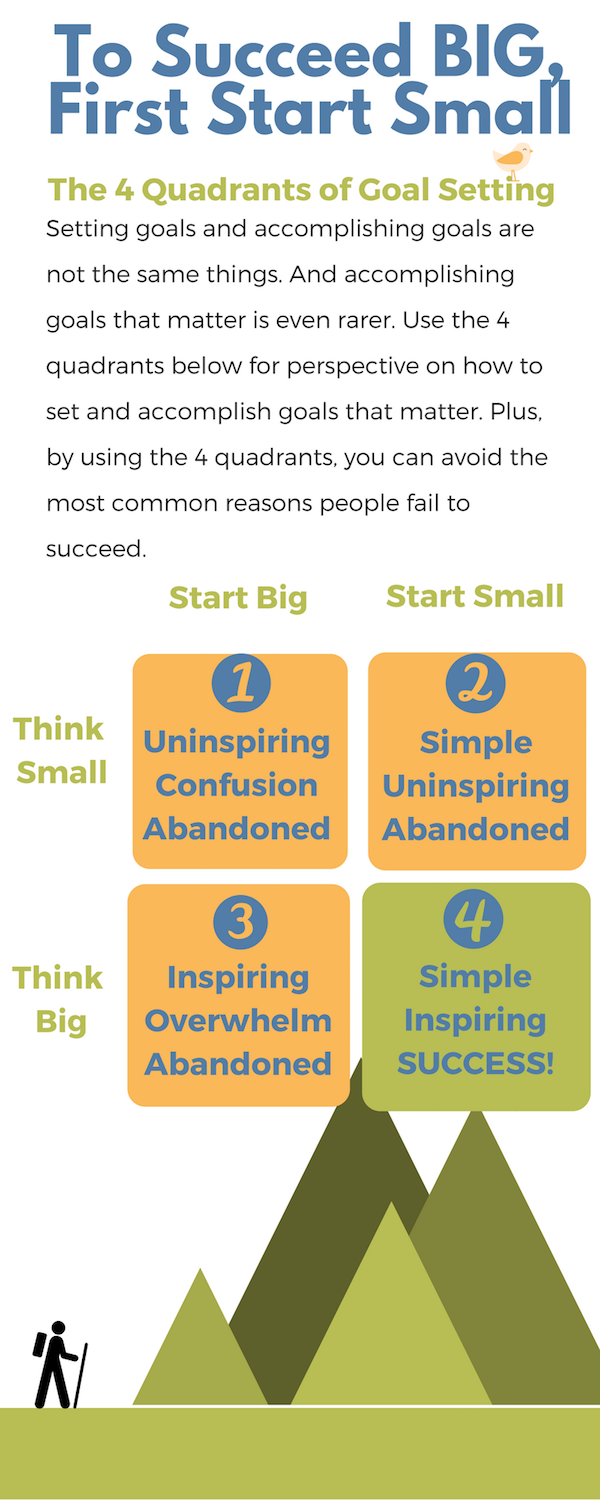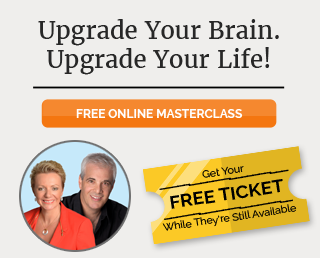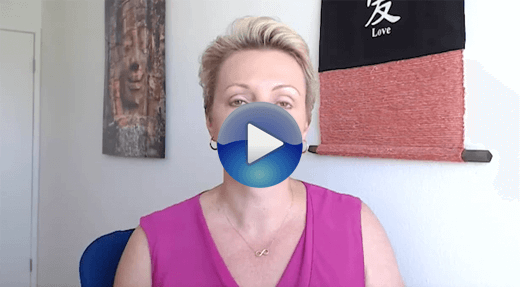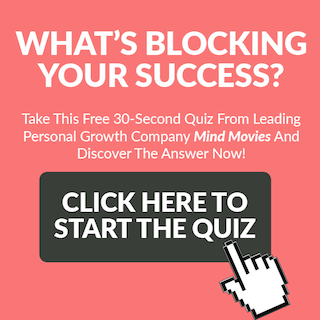Today on the blog, we share an inspiring guest post by life coach, author and speaker, Sean McCool. Enjoy :-)
Did you know there are 3 wrong ways to approach goal setting? If you’re looking to accomplish big things in your life, wouldn’t you agree it might be important to understand what not to do, as well as the most effective approach?
There’s no doubt, thinking big is vital to living with wealth and courage in every area of your life. Johann Wolfgang Von Goethe said: “Dream no small dreams for they have no power to move the hearts of men.” And this is certainly true.
But I’d like to have you consider, the people that are willing to start small are more likely to succeed and leave a long-term impact in life.
You see, I’ve discovered there are really only 4 ways to approach your goals. And only one has the ability, and power, to both motivate you and allow you to leave an impact in the world. Think of these 4 approaches as being quadrants of effectiveness on a 2x2 grid. On the left you have Think Small and Think Big. Across the top you have Start Big and Start Small. When combined, the grid gives us 4 possible approaches.

Let’s take a look at each of these 4 approaches and why only one consistently delivers truly big results:
Approach #1 - Think small. Start big. Because there are no big dreams to drive you forward, this approach is uninspiring. And of course, if you’re thinking small, then starting big just confuses you because there’s nothing big to do.
Result: Goal abandoned.
Approach #2 - Think small. Start small. These are the simple but uninspiring goals. These tend to be clones of goals you’ve set in the past. You know you can set and achieve them and you do. The trouble is, they leave you feeling empty and without purpose since they tend to serve only you in the present moment.
Result: A. Goal abandoned. OR B. Goal achieved but with no lasting impact or satisfaction.
Now let’s move onto big thinking…
Approach #3 - Think big. Start big. This is the quadrant where many high achievers try to start but end up failing. Why? Because although you may have a big vision to pull you forward, if you start too big, then you quickly become overwhelmed by all there is to do and frustrated at all there is to learn.
Result: Goal abandoned. Personal or professional burnout.
Approach #4 - Think big. Start small. This is the sweet spot. A big vision that keeps you motivated and in the game with small steps so that you’re not overwhelmed or frustrated.
Result: Goal Accomplished!
Let’s take a closer look at this final approach…
Think Big
The first thing you need to do is create a big goal that inspires you to see it through to its fulfillment. What are you trying to do? What is your ultimate goal? Why does it matter? Be bold here. Don’t be afraid to be unrealistic at times. Trust deeply in who you are and what you’re here to accomplish in the world.
Remember, your big thing is your big thing. It can be anything your heart desires and it doesn’t need to make sense to anyone else. Maybe you want to start a video game development business, or maybe you want to be an Olympic swimmer. Everyone is different, but it's important to have a well-defined goal. Don't be afraid to be specific and to list a goal even if you're lacking the confidence to achieve it right now.
HINT: One thing I’ve discovered is that a truly big goal that creates an impact will include a benefit to others outside of myself once achieved. Even the example of an Olympic swimmer can have far reaching impact if you use that journey as a way to inspire others to greatness.
Start Small
After you establish your big goal, it's time to break it down and make it happen. Success will happen as long as you consistently take one small action at a time. Mother Teresa said, “If you can’t feed a hundred people, then feed just one.” In other words, start with what you can do.
For example, let's say your ultimate goal is to own a video game development business. You currently work at a dead end job and you have little revenue to use towards your goal, so you assume it'll never happen and you just go about your day. But what if you took just 20 minutes each day and worked towards your goal?
Here are some of the “start small” actions you could take:
1. You can research how much money it would take to start up your business.
2. You can learn the ins and outs of the industry by reviewing different courses and training programs.
3. You can make appointments to meet with banks or companies as potential investors.
4. You can contact independent game developers that may be willing to take on extra work at a reasonable cost.
5. You can research and formulate marketing tactics.
6. You can create a 5-year plan.
While the business requires a great deal more than these 6 actions, you can see what it means to break down your big goal into smaller actions. By consistently and intentionally taking small actions towards your big goal, your chance of success is much higher. And in my experience, you’ll actually succeed faster than starting big.
Something Is Always Better Than Nothing!
When I work with my clients, I tell them that five minutes completing a small action now will always beat waiting to take a big action later. You probably know that some action is always better than no action towards your goal. It may sound trite, but you'll never get there if you don't get into action. Just think of how far along you’ll be by taking action just 10 minutes a day on your goal for a whole year. That's a lot of small, manageable projects completed instead of one huge project put off waiting for a better time. So start now, and thank yourself later!








